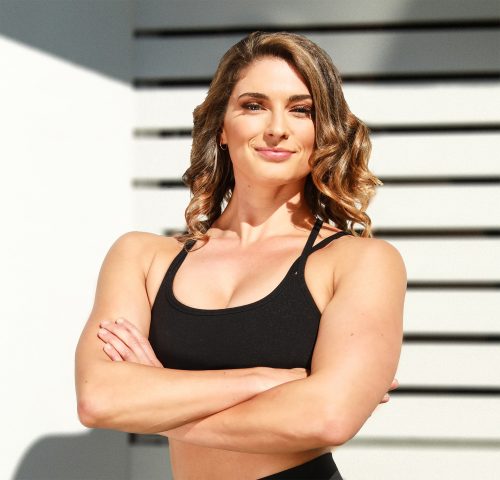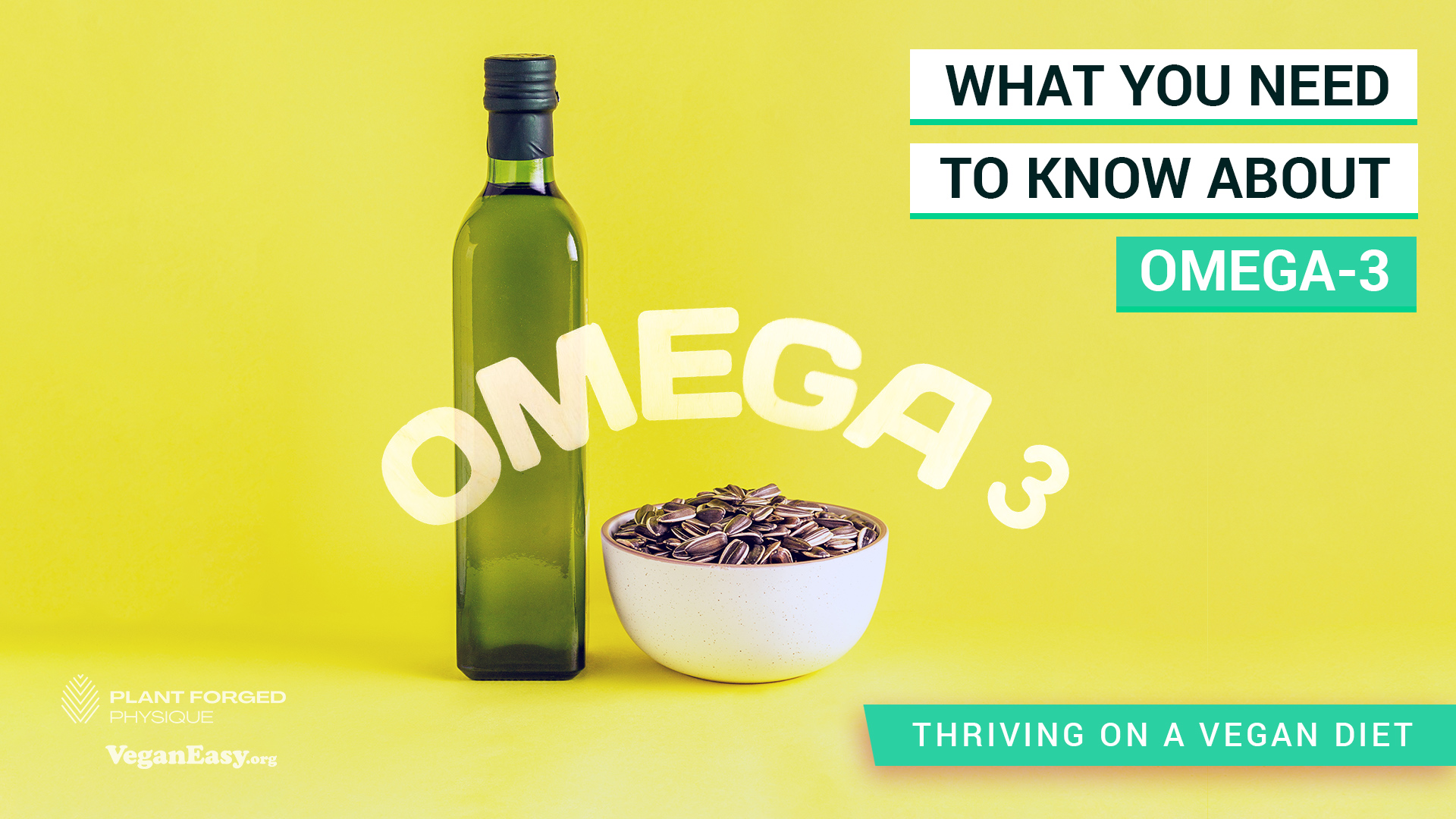
 Micronutrient mini-series
Micronutrient mini-series
This article series is a spotlight on the micronutrients, vitamins and minerals you need on a vegan diet. We look at where you can get them, how much you need, if supplementing is necessary, and tips for incorporating them into your plant-based diet.
Article by Caitlin Adler, a vegan Accredited Sports Nutritionist, Strength & Conditioning coach and bodybuilder at Plant Forged Physique. Her passion is helping vegans achieve their health and fitness goals with evidence-based guidance and expertise. Check out their free Vegan Supplement Cheat Sheet and other resources.
Omega-3 fatty acids are a family of essential polyunsaturated fats. There are three main Omega-3s: Eicosapentaenoic acid (EPA), Docosahexaenoic acid (DHA) and Alpha-linolenic acid (ALA).
Omega-3s play a role in the creation and functioning of cell membranes throughout the body. They aid with hormones that regulate blood clotting, functioning of artery walls, and inflammation. Omega-3s help prevent heart disease and stroke, as well as managing lupus, eczema, rheumatoid arthritis, and may play protective roles in cancer.
A 2016 analysis revealed that 80% of the general Australian population are not meeting the recommended intakes for Omega-3 long chain polyunsaturated fatty acids.
Low consumption of Omega-3 fatty acids can lead to deficiency, where Omega-3 levels become too low to maintain the body’s requirements. Symptoms of Omega-3 fatty acid deficiency include fatigue, poor memory, dry skin, heart problems, mood swings or depression, and poor circulation.
How much?
Vegan diets are high in ALA – which is found easily in nuts and seeds – but most studies show that vegans consume low amounts of DHA and EPA. As only 20% of the Australian population are meeting their Omega-3 needs, this issue affects vegans and non vegans alike.
ALA can be converted by the body to DHA and EPA but the process is slow and inefficient. This can be improved by reducing intake of linoleic acid in your diet – found primarily in safflower, sunflower, and corn oil – and also consuming more ALA to help increase the amount of DHA and EPA made.
So while there’s no recommended intake of Omega-3s specific to vegans, research suggests vegans and vegetarians should consume 2200–4400mg of ALA per day if no direct sources of DHA and EPA are consumed. If supplementing with DHA and EPA, consuming 1100mg of ALA for women and 1600mg of ALA for men is sufficient to meet your needs.
Most health organisations recommend a minimum of 250–500mg DHA and EPA each day for healthy adults.
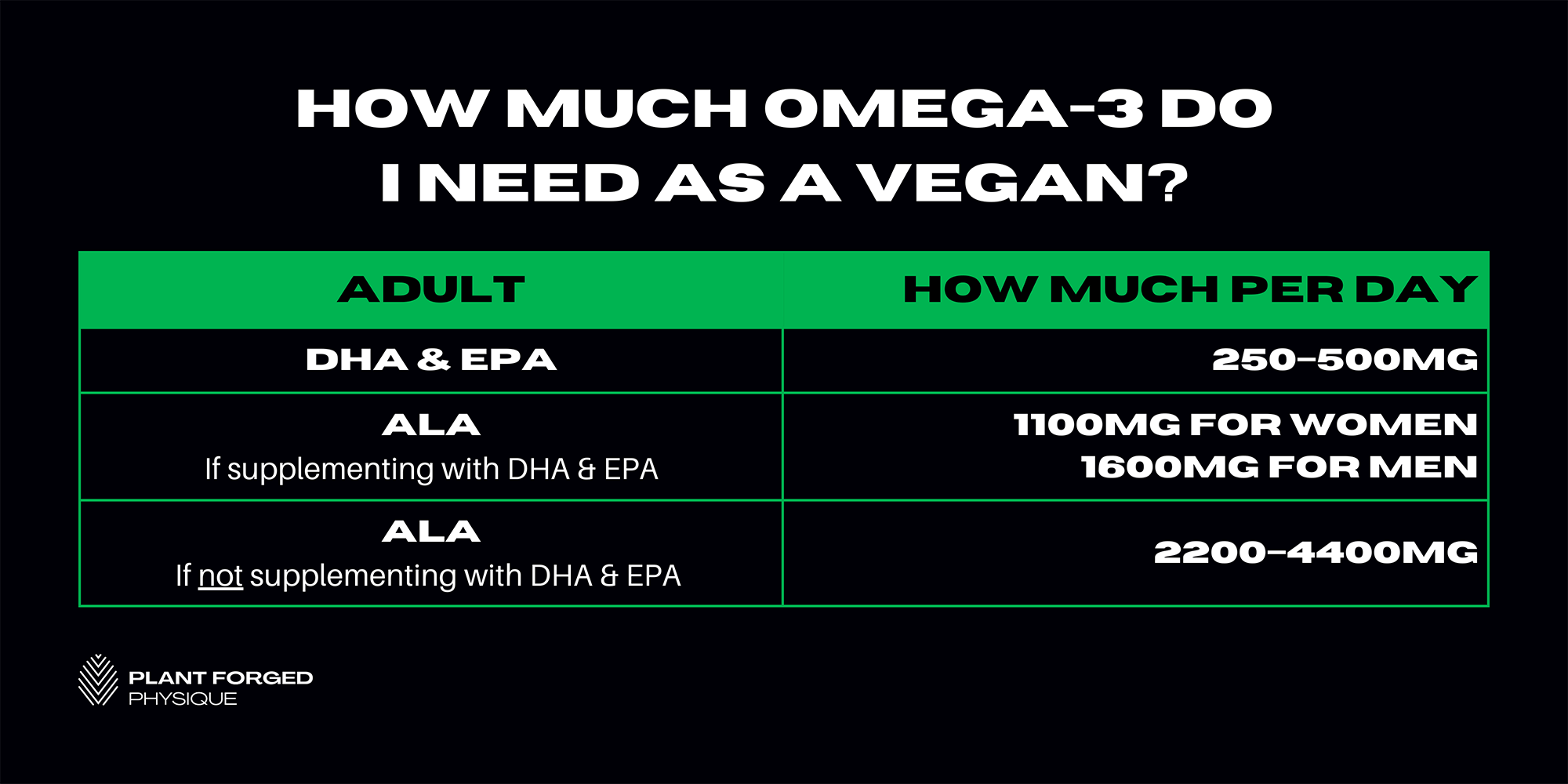
Where from?
ALA is found in plant oils, seeds and nuts, like chia seeds, hemp seeds, walnuts, flax seeds and flaxseed oil. DHA and EPA are often called marine omega-3s because they are found originally in algae. DHA and EPA are also found in fish, which get it from the algae they eat.
Some common sources of ALA are:
- 1 Tbsp Flaxseed oil / 7000-8000mg
- 30g Walnuts / 2500mg
- 3 Tbsp Hemp seeds / 2600mg
- 30g of Hemp seeds / 3000mg
- 30g Chia seeds / 5000mg
- 100g Firm tofu / 400mg
- 1 Tbsp Canola oil / 1300mg
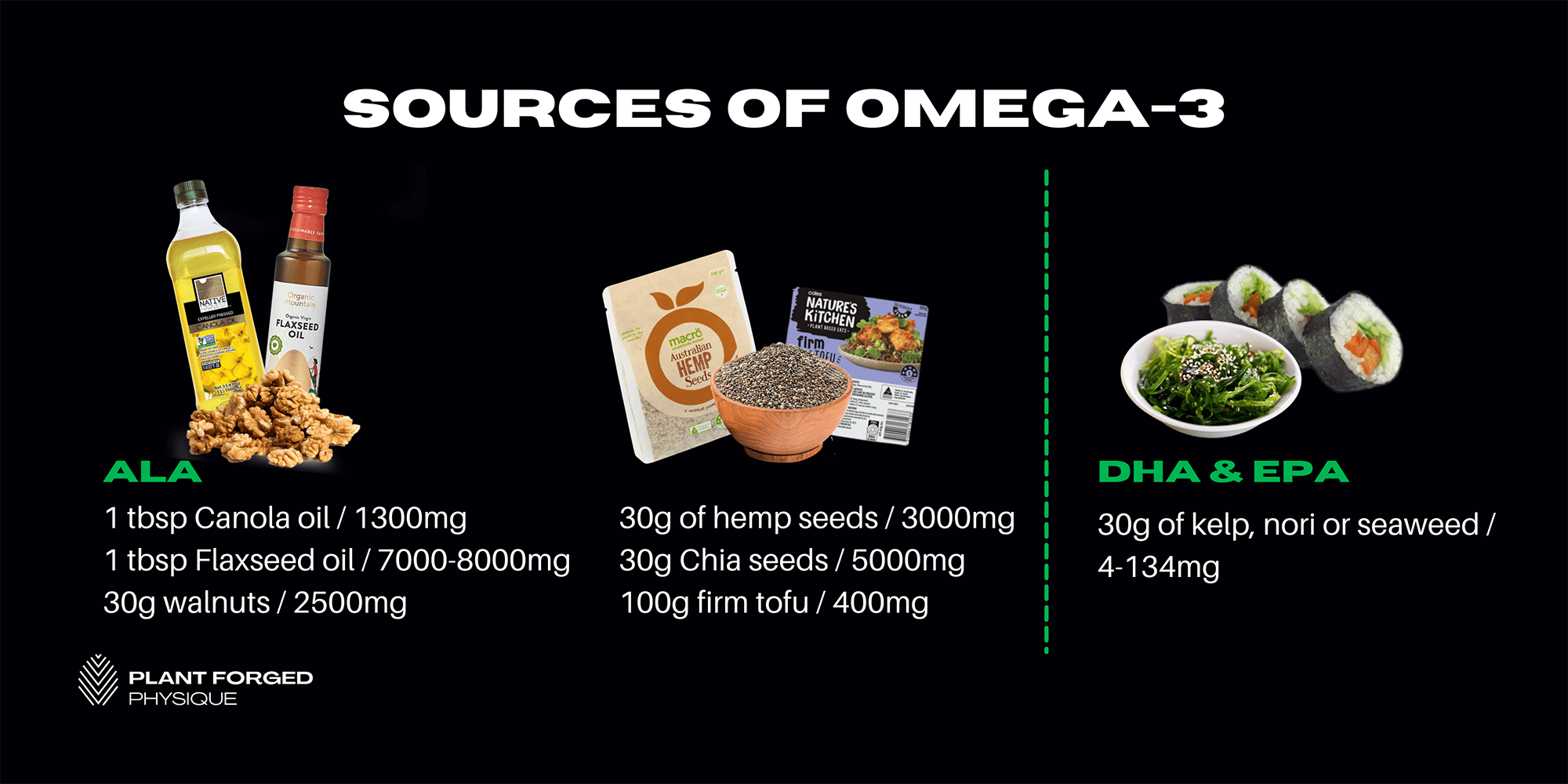
While seaweed (nori) and kelp (wakame, kombu or dulse) do contain DHA and EPA – it’s in small amounts. In a 30g serving, you get 4-134mg. So it can be impractical for vegans to meet their EPA/DHA needs from wholefood algae sources alone.
Supplementing
Because of the low amount of EPA/DHA found in a vegan diet, it’s recommended that vegans supplement with 250–500mg of combined EPA/DHA per day for general health.
DHA and EPA is vital for the healthy development of babies. Only 10% of women of childbearing age meet the recommended DHA intake.
DHA is found to be lower in the breast milk of plant-based mothers than omnivorous mothers. So pregnant vegans should take at least a 300mg EPA/DHA supplement per day.
For amateur or professional athletes, supplementing with 1500-2000mg of EPA/DHA each day for 6-8 weeks has shown to improve performance, endurance, recovery and fatigue. So you may want to increase your daily dose if participating in regular sport or exercise.
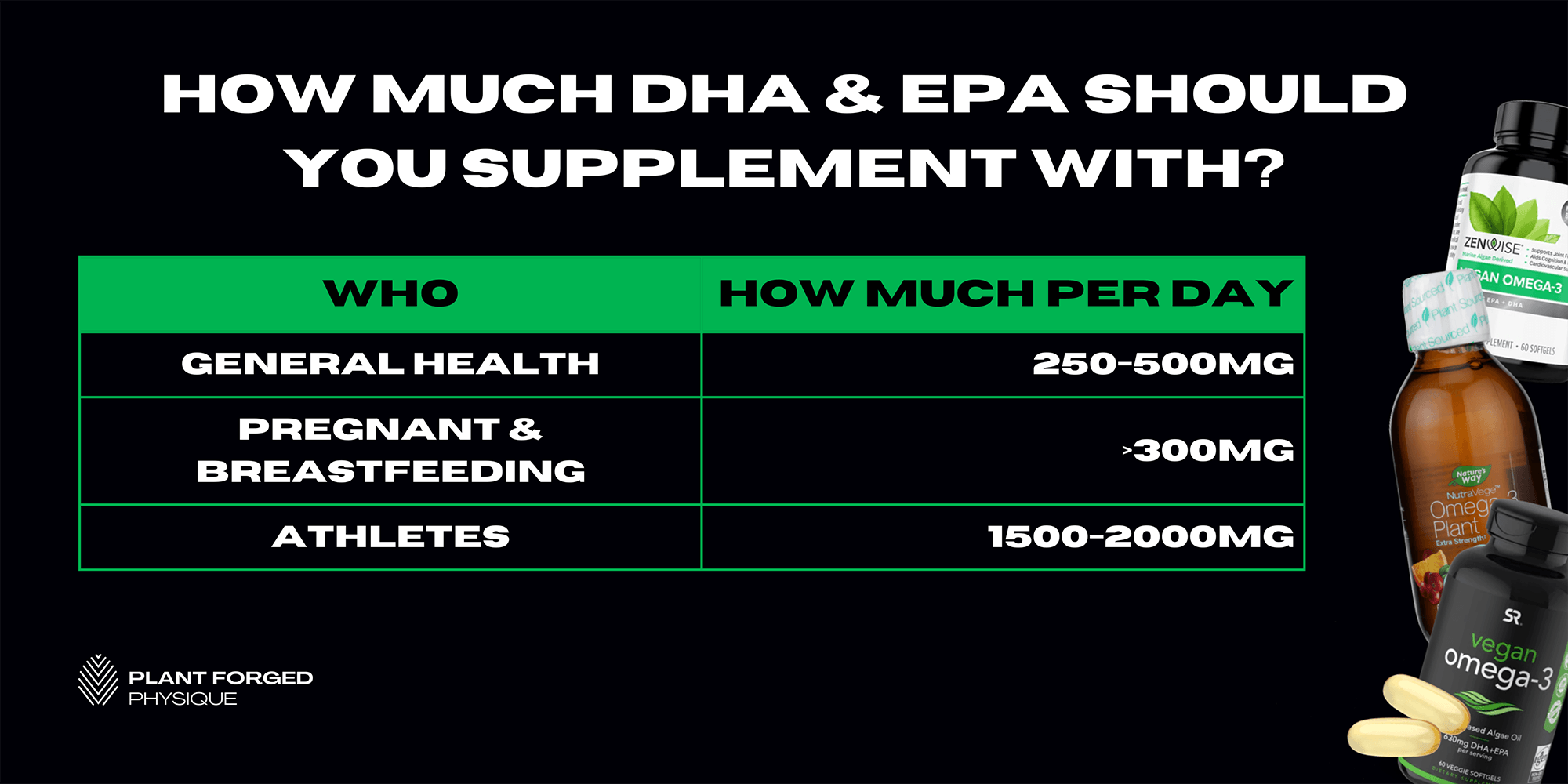
Some vegan DHA and EPA products include:
For general health (min 250mg)
For general health and pregnancy (min 300mg-500mg)
- Ovega-3
- Vegetology Omega-3
- Source Naturals, Vegan Omega-3s
- Nature’s Way, NutraVege, Omega-3 Plant 500mg
- Wanderlust Plant Omega 3
- Zenwise Health, Vegan Omega-3
For athletes (min 1000mg)
Key takeaways
While ALA is commonly occurring in a vegan diet, DHA and EPA are not prevalent in a plant-based diet. So it’s recommended for vegans to supplement daily with DHA and EPA to ensure they are meeting their required intake.
Summary
- Meeting your Omega-3 needs is vital for overall health
- ALA is easily found in nuts and seeds, but DHA and EPA are only found in very small quantities in nori, kelp and algae foods.
- ALA can be converted by the body into DHA and EPA but it’s inefficient and slow
- Supplementing with combined DHA and EPA each day is recommended for vegans
- 250–500mg for general health
- >300mg for pregnant or breastfeeding mothers
- 1500-2000mg for athletes and heavy exercisers
- If supplementing with DHA and EPA, vegans should consume ALA of 1100mg for women and 1600mg for men, daily
- But if not supplementing, vegans should increase their ALA to 2200–4400mg per day
FREE VEGAN SUPPLEMENT CHEAT SHEET
Want to learn more about supplementing as a vegan?
Download the Free Vegan Supplement Cheat Sheet from Plant Forged Physique.
This handy evidence-based guide outlines exactly what supplements are needed to improve muscle gain, health, performance, recovery, and fat loss – and which ones are a waste of your time and money!
